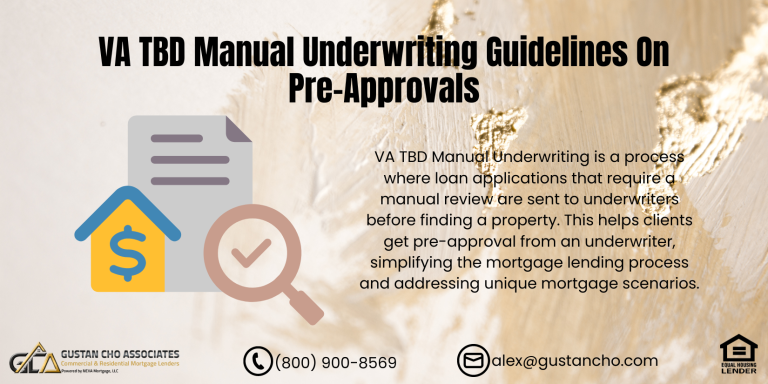This blog will discuss the HUD and Fannie Mae Guidelines on credit disputes during the mortgage process. We will outline the key points from the most recent updates to the HUD and Fannie Mae guidelines on credit disputes. Credit disputes occur when a consumer finds errors on their credit report that shouldn’t be there.
The major credit reporting agencies—Experian, Equifax, and TransUnion—have been known to make errors. Individuals should review their credit reports annually. The following paragraphs will delve into the HUD and Fannie Mae Guidelines on credit disputes during the mortgage process.
HUD and Fannie Mae Guidelines on Credit Disputes
HUD Guidelines on Credit Disputes:
-
- HUD requires that any credit accounts with disputed derogatory credit (late payments, collections, charge-offs, etc.) must be resolved or verified before they can be ignored in the underwriting process.
- If a borrower has disputed accounts with a balance over $1,000, the underwriter must include these accounts in the debt-to-income ratio calculation.
- For FHA loans, disputes on non-derogatory credit information (such as disputes about paid accounts, disputed accounts with zero balance, etc.) typically do not need to be resolved.
Fannie Mae Guidelines on Credit Disputes:
-
- Fannie Mae requires lenders to investigate the nature of disputed credit accounts.
- If derogatory credit information is disputed, the lender must determine whether the dispute is valid.
- If the dispute is valid and the credit report accurately represents the borrower’s current credit history, it can be used in the underwriting decision.
- Disputed tradelines must be included in the credit risk assessment, and the lender must ensure that the loan complies with Fannie Mae’s eligibility requirements.
By adhering to these HUD and Fannie Mae Guidelines on Credit Disputes, lenders can accurately assess a borrower’s creditworthiness while ensuring compliance with regulatory standards.
Have Credit Disputes? Learn How HUD and Fannie Mae Guidelines Affect Your Loan Approval!
Contact us today to understand how HUD and Fannie Mae handle credit disputes and how we can help you navigate the process.How Can I Get a Free Mortgage FICO Score?
You are allowed by federal law to get a duplicate of your consumer credit report from each of the credit reporting agencies through the website annualcreditreport.com. It is recommended that these requests be staggered instead of ordered all at once. This allows you to receive one credit report every four months, enabling you to review your credit report three times a year.
Note that www.annualcreditreport.com provides your credit report for free, but there is a fee for obtaining your credit score. This blog will discuss HUD and Fannie Mae Guidelines on Credit Disputes. Additionally, there are other credit services, such as Credit Karma and Equifax.com, which, for a monthly subscription fee, provide access to your credit report and notify you of any changes in your credit report or credit scores.
Does Fannie Mae Require a Credit Score?
Yes, Fannie Mae requires a credit score for its mortgage programs. Here are the key details:
- Minimum Credit Score Requirements:
- Fixed-Rate Mortgages: The minimum credit score required is typically 620.
- Adjustable-Rate Mortgages (ARMs): The minimum credit score is generally higher, often around 640.
- Factors Affecting Credit Score Requirements:
- Loan-to-Value (LTV) Ratio: Higher LTV ratios may require higher credit scores.
- Debt-to-Income (DTI) Ratio: A higher DTI ratio might necessitate a higher credit score.
- Type of Property: Different property types (e.g., single-family homes, multi-family properties, condos) may have varying credit score requirements.
- Other Financial Considerations: Overall financial profile, including assets and employment history, can also impact the required credit score.
Fannie Mae has established guidelines to assess the risk associated with lending and ensure that borrowers can repay the loan. It’s always best to consult the most current guidelines or speak with a mortgage professional for specific requirements related to your situation.
This content adheres to the HUD And Fannie Mae Guidelines On Credit Disputes, ensuring compliance and accuracy in assessing creditworthiness.
How Does My Credit Score Affect Getting a Mortgage?
When you request a mortgage, you will be required by the lender to fill out an application and review your credit. When you request a mortgage, you will be required by the lender to fill out an application and verify your credit history. Your mortgage broker will review your application, including your listed assets, income, and debts, and compare it with your tri-merge credit report.
The loan officer will examine your credit history, particularly your payment history over the past 12 months. Most mortgage companies do not permit any 30-day late payments within this period.
During the review of your credit report, the mortgage broker will also consider any prior bankruptcies, judgments, foreclosures, short sales, deeds instead of foreclosure, and credit disputes. In a later paragraph, we will provide more details on HUD and Fannie Mae’s Guidelines on Credit Disputes.
Do Mortgage Rates Depend on Your Credit Scores?
A borrower’s credit score plays a vital role in calculating mortgage rates for all loan types. Credit scores are essential for qualifying for various loan programs, including FHA, Conventional, VA, USDA, Jumbo, Portfolio, Non-QM Loans, etc. These scores can fluctuate significantly from month to month and can be adjusted by a loan officer.
For instance, if your credit score is 570 FICO but you need a 580 FICO score to qualify for an FHA loan with a 3.5% down payment, there are quick fixes to address this issue. The quickest and simplest method to increase your credit score is often by reducing the balances on your credit cards.
Understanding HUD and Fannie Mae Guidelines on Credit Disputes is vital, as unresolved disputes can impact your credit score and loan eligibility.
Do Mortgage Lenders Look at Disputes?
Yes, mortgage lenders consider credit disputes during the loan application process. They scrutinize any accounts marked as disputed on a credit report since these can sometimes artificially inflate a credit score or obscure derogatory information. Disputed derogatory accounts, such as late payments, collections, or charge-offs, generally must be resolved before the loan can be approved.
Lenders might ask borrowers to submit documentation or a written explanation about the disagreement. Sometimes, they may ask borrowers to remove the dispute from their credit report to assess its impact on the credit score and report accurately.
Fannie Mae and Freddie Mac have particular guidelines for handling credit disputes. They usually require the resolution of disputed accounts with negative information before proceeding with the loan. Non-derogatory disputed accounts, such as disputes on paid-off accounts or those with zero balances, typically do not need to be resolved. Furthermore, disputed accounts with balances may still be included in debt-to-income ratio calculations if the disputes are unresolved.
Automated underwriting systems like Fannie Mae’s Desktop Underwriter (DU) or Freddie Mac’s Loan Product Advisor (LPA) can lead to additional scrutiny or conditions triggered by disputes. Understanding HUD and Fannie Mae guidelines on credit disputes can help borrowers address potential issues in advance, ensuring a smoother mortgage approval process.
Wondering How Credit Disputes Impact Your FHA or Conventional Loan? Let Us Help!
Reach out now to learn how these guidelines apply to your situation and get expert advice on how to move forward.Can You Get a Mortgage With Disputes on Your Credit Report?
Credit disputes during the mortgage process can be a deal killer. Fannie Mae and Freddie Mac do not allow any credit disputes during the mortgage approval process. The mortgage process will be in suspense until the credit disputes are retracted by the borrower. With FHA, all medical credit disputes are exempted and so are medical collections. With non-medical credit disputes, as long as the aggregate dollar amount is less than $1,000, then the credit disputes are exempted. If the aggregate credit disputes are greater than $1,000, then the credit disputes need to be retracted and a new credit report needs to be pulled reflecting the disputes.
Can Removing Disputes Lower Credit Scores?
When you retract credit disputes, be prepared to see your credit scores drop. Sometimes retracting a credit dispute with a credit balance can drop a consumer’s credit scores by more than 50 plus points. Prior to applying for a mortgage loan, please consult with a mortgage broker and go over your credit report and credit scores. You should really have your credit disputes removed before you put an offer in on a home.
For Fannie Mae, credit reports are valid for 120 days from the report’s pull. This means the credit report must be at most 120 days at the time of the loan closing.
How Long are Credit Reports Good for Fannie Mae?
Below are a few more important highlights to consider regarding the accuracy of credit reports for Fannie Mae loans:
- New Construction: The credit report can be valid for up to 180 days for new construction properties.
- Re-pulling Credit: If the loan closing is delayed beyond the validity period, a new credit report must be pulled to ensure the most current credit information is used in the underwriting decision.
- Continuous Monitoring: Lenders are expected to monitor any changes in the borrower’s credit profile until closing. Significant changes in credit behavior, such as new debts or missed payments, can impact loan eligibility.
These guidelines help ensure the borrower’s creditworthiness is accurately assessed based on the most recent credit data available.
FAQs: HUD And Fannie Mae Guidelines On Credit Disputes
-
1. What are credit disputes? Credit disputes occur when a consumer finds errors on their credit report that should not be there. Common errors include incorrect personal information, inaccurate account details, or fraudulent activity. It’s important for individuals to regularly review their credit reports to make sure that the information is correct.
-
2. What are the HUD guidelines on credit disputes? HUD requires that any credit accounts with disputed derogatory credit (such as late payments, collections, or charge-offs) be resolved or verified before they can be ignored in the underwriting process. If a borrower has disputed accounts with a balance over $1,000, these accounts must be included in the debt-to-income ratio calculation. Disputes on non-derogatory credit information (like paid accounts or zero balance disputes) typically do not need to be resolved for FHA loans.
-
3. What are the Fannie Mae guidelines on credit disputes? Fannie Mae requires lenders to investigate the nature of disputed credit accounts. If derogatory credit information is disputed, the lender must determine if the dispute is valid. Valid disputes and accurate credit reports can be used in the underwriting decision. Disputed tradelines must be included in the credit risk assessment, and lenders must ensure the loan complies with Fannie Mae’s eligibility requirements.
-
4. Does Fannie Mae require a credit score for mortgage programs? Fannie Mae requires a credit score for its mortgage programs. The minimum credit score for fixed-rate mortgages is typically 620, while adjustable-rate mortgages often require a minimum score of around 640. Factors such as loan-to-value (LTV) ratio, debt-to-income (DTI) ratio, and property type can also affect the required credit score.
-
5. How does my credit score affect getting a mortgage? When applying for a mortgage, your credit score is crucial. Lenders review your credit history, including payment history, bankruptcies, judgments, foreclosures, and disputes. Most mortgage companies have not allowed 30-day late payments in the past 12 months. The types of loans you can qualify for, and your credit score impacts the mortgage rates offered.
-
6. Do mortgage lenders look at credit disputes? Yes, mortgage lenders consider credit disputes during the loan application. Disputed derogatory accounts, such as late payments or collections, must be resolved before loan approval. Lenders may require documentation or a letter of explanation and might ask borrowers to remove disputes from their credit reports to assess the true impact on the credit score.
-
7. Can you get a mortgage with disputes on your credit report? Credit disputes can complicate the mortgage process. Fannie Mae and Freddie Mac do not permit unresolved credit disputes during the approval process. FHA loans exempt medical credit and non-medical disputes if the total is less than $1,000. Disputes over this amount must be resolved before proceeding.
-
8. Can removing disputes lower credit scores? Removing credit disputes can sometimes lower your credit score, potentially by more than 50 points. Before applying for a mortgage, it is recommended that you seek advice from a mortgage broker regarding reviewing your credit report and any disputes.
-
9. How long are credit reports good for with Fannie Mae? Credit reports for Fannie Mae are valid for 120 days from the date they are pulled. The credit report can be valid for up to 180 days for new construction properties. If the loan closing is delayed, a new credit report must be obtained to ensure the most current information is used.
By following these guidelines, lenders can accurately assess a borrower’s creditworthiness while complying with regulatory requirements.
If you have any questions about HUD And Fannie Mae Guidelines On Credit Disputes or you need to qualify for loans with a lender with no overlays, please contact us at 800-900-8569. Text us for a faster response. Or email us at alex@gustancho.com. The team at Gustan Cho Associates is available 7 days a week, on evenings, weekends, and holidays.
Related> Guidelines on Credit Disputes
Related> Credit disputes during the mortgage process can disqualify you for mortgage
This blog about HUD And Fannie Mae Guidelines On Credit Disputes was updated on June 6th, 2024.










